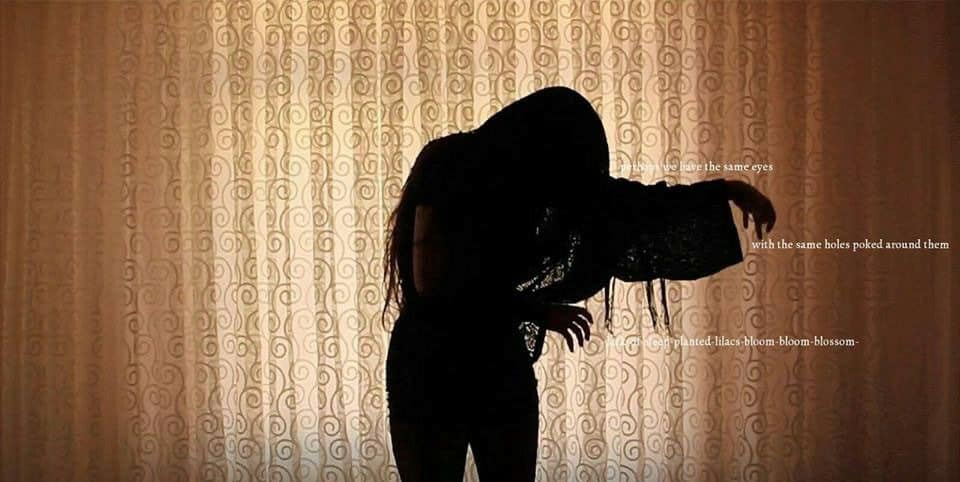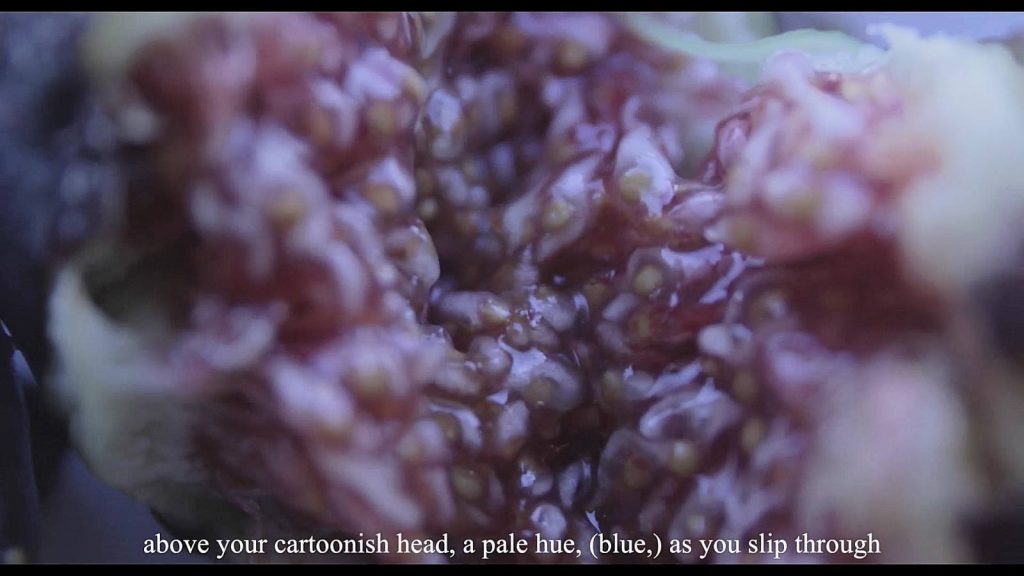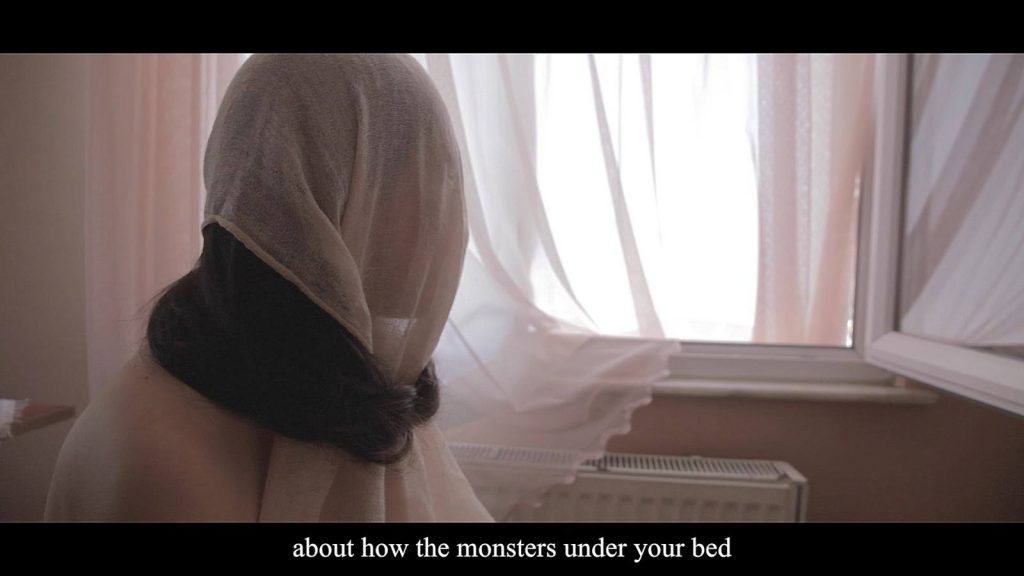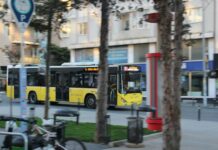Gamze Saymaz, born in 1994, is a poet based in Istanbul. She studied English Language and Literature as well as Psychology while participating as an actor in student films. She worked on various projects on psychoanalysis and existentialism. For the first time she worked behind the camera with her recent collaborative project “creased; or a screenpoem” We talked about her early works, screenpoem and her art.

Before we talk about “creased; or a screenpoem” where you worked both in front of and behind the camera, we would like to hear about your earlier projects. We believe there have been some short films you have acted in. Can you talk about your experiences there? What does acting mean to you?
Saymaz: Yes, I have started with student films, if we have to pick a starting point in terms of the on-camera part of it, but I had a background of six or seven years -that always felt unfinished- in theater before that. Even though there might not be anything that can come close to the physical and emotional reaction the stage triggers or creates, I have always had cinema at the back of my mind. When couple of my friends whom I share similar passions with started double majoring in Cinema, it was the push that one shouldn’t wait for yet still does, and I started acting in their projects. Acting for me is the way of existing that has the most room for dodging anxiety, I guess. What I lost when I quit theater, then found all over or where I left it, really, again is this “another way of existing/being.” Waiting in the wings or for action, that last bit of stomach ache -the chronic kind is more of a chest pain- left from everyday worries, dies out/disappears with a single step or a single word and turns into a feeling of “free” which is something I usually struggle with. This metamorphosis could very well be what stole my heart. I terribly want to exist…
Around the same time period you wrote and edited for Yeditepe University English Language and Literature zine “Poetree”. What was that experience like for you? Would you consider doing something of the sort again?
Saymaz: Poetree was a nice trigger I would realize how much I needed it much later, when I look back on it. Because it was one of the factors that helped me turn poetry -which I used to write with the consistency of water- into routine. Having something in your life that is not binding but brings a sense of duty, and to see, to realise, to remember that you can keep pace with it is helpful for anyone who is occupied with any form of creation. Considering that I have never stopped writing after Poetree, and how “me” my pen has become in a couple of years, I can see that it improved both my work ethic and my work. When it comes to doing that again, writing is a thing of continuity in my life now, and of course I would like for I write to go somewhere. Editing aspect, though left incomplete for various reasons, is something I would definitely like to give another shot.
How did your poetry journey start?
Saymaz: This question was asked couple of months ago for an interview that would never see the light of day, and I found the stupid courage to respond with a painful and embarrassing analogy that goes like “I do not remember writing a poem for the first time very much like I do not remember my birth.” After the shooting was complete, Jade Mulvaney, the director I collaborated with in “creased” said that I sold the idea to her with a sentence that happened to escape my mouth somehow, when talking about why we write, film, create etc. the day we first met: That’s only way I know how to exist. And I want to exist terribly. I guess that’s exactly how it started.

Your mother tongue is Turkish and you write your poems in English in which you are as fluent as your native tongue. This, as I, too, have witnessed, causes bilingual artists to receive some negative criticism. There can be righteous approaches like “everyone should write in their own native language.” How do you deal with such mentality and what are your suggestions to bilingual artists?
Saymaz: First we have to accept that this does not have anything to do with one language being insufficient or one language being superior than the other. When I realised I express myself better in English, I began drifting towards writing in it, but that was a highly personal process. I did not sit down one day and said to myself “I will write in this language from now on,” I sat down and found myself writing in English organically. I am still learning to adjust to the extremely expected disadvantages of me not writing in the official language of the country I live and try to work in, but “creased” was received so well in the same country, though in a very tiny part of it, despite the language, or perhaps because of the language, maybe expectations do not really mean that much in areas requiring such risk taking. They can assess this possibility.
The preview screening of “creased; or a screenpoem” was at Komşu Kafe Collective, and the main exhibition followed with a screening at studio H. It will be shown again at Karga Art in this June. Can you talk about its conceptual content for those who haven’t experienced “creased” yet?
Saymaz: The screenpoem, dealing with timeless existential troubles like time and sleep while also sleeplessly tackling the origin of ghosts, revolves around a girl who wakes up to find two eye holes cut into the bed sheet she was sleeping on and starts to experience strange events which are slowly revealed to be her playing pretend to train her fears and clothed e/motions relentlessly trapped and freed over and under again.
Creased is a highly interdisciplinary work bringing together video art, poetry, performance, and short film elements. In a post-show talk, you mentioned that you can create the effect you want the poem to carry by integrating visuals and performance in a holistic manner, so you invented screenpoetry. Would you elaborate?
Saymaz: I think it’s more of making up rather than inventing. If I am to talk about my own poetry, though I made my peace with the fact that the artwork can be perceived as its own independent entity the second it’s done, I also had a bit of a pretentious concern that goes like “on paper, what I hear shall be heard.” Yet the human perception can only be manipulated so far in this context. When I accepted that I do not have to pick only one of the areas I am interested in, and let go of the romanticism of devoting my entire existence to a single discipline, I aimed to reach the most “complete” human experience I could by utilizing each and every sensation I can. I may have done the opposite of elaborating. The work never ends…

Who are some of the artists you are inspired by?
Saymaz: The one I feel like you can almost hear in my work must be E. E. Cummings. Anne Sexton and Sam Sax are ones I connected with instantly. Also Savannah Brown in poetry performance. Visual-storytelling-wise Xavier Dolan and Darren Aronofsky comes to mind along with new wave horror movement. In the multimedia territory, I find Mitch Welling’s Flatsound project unbelievably inspiring, such a motivation refresher.
Do you have any future projects planned? How will we see Gamze Saymaz next time?
Saymaz: There is a spoken word project essentially based on online experience I have been working on for a while now, that I can share. There might be other stuff, too. Maybe.
Lastly every show every project is the result of a production process and offers teachings. What did you learn from the project “, creased; or, a screenpoem?”
Saymaz: For beginners, I learnt how I work, and how I function. I began to learn rather. Because, normally I am too much in my head and “creased” pushed me out. To project my mind physically is not an area I am very familiar with, it was always someone else’s mind to an extent that came through when I was acting. This time, the emotional nudity belonging to you alone without an extra layer you could hide behind, and processing that, or failing to do so, while acting it out forces you out of your comfort zone. Sharing such an experience with others, presenting it to others, calling yourself an artist, pushing your boundaries, it taught me to be perhaps a bit more comfortable with myself and a bit kinder to myself which I still struggle with. Maybe I will never have that kind of mentality truly, but this project showed me the value of the creation process alongside the creation itself, and that process is good enough for me for the work never ends.
—
Next exhibition of creased is a group exhibition “creased or cramped: poetry on planes” with abstract paintings of another poet Çağla Bölek, on June 3-4 2018 19:00 at KargART.
To keep up to date with Gamze Saymaz, be sure to check her official facebook page, the filmmaker Jade Mulvaney and the poet Çağla Bölek.









